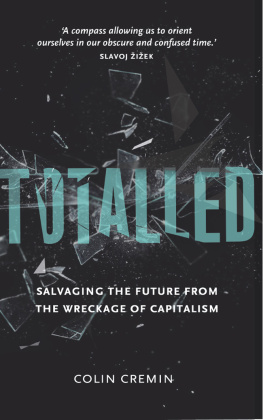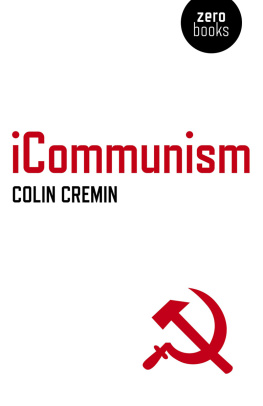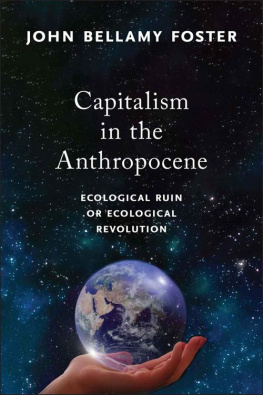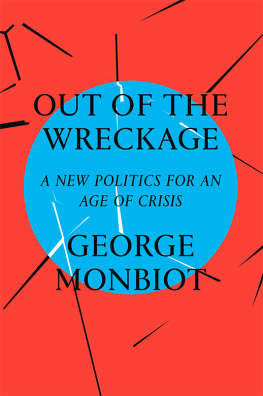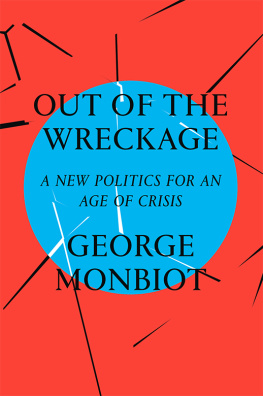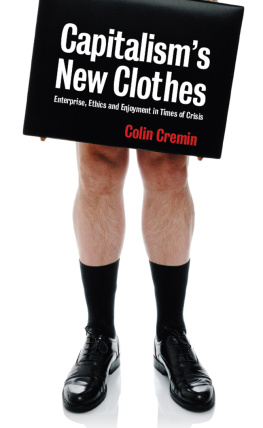Totalled
Totalled
Salvaging the Future from
the Wreckage of Capitalism
Colin Cremin

First published 2015 by Pluto Press
345 Archway Road, London N6 5AA
www.plutobooks.com
Copyright Colin Cremin 2015
The right of Colin Cremin to be identified as the author of this work has been asserted by him in accordance with the Copyright, Designs and Patents Act 1988.
British Library Cataloguing in Publication Data
A catalogue record for this book is available from the British Library
ISBN978 0 7453 3438 7Hardback
ISBN978 0 7453 3437 0Paperback
ISBN978 1 7837 1267 0PDF eBook
ISBN978 1 7837 1268 7Kindle eBook
ISBN978 1 7837 1266 3EPUB eBook
Library of Congress Cataloging in Publication Data applied for
This book is printed on paper suitable for recycling and made from fully managed and sustained forest sources. Logging, pulping and manufacturing processes are expected to conform to the environmental standards of the country of origin.
10987654321
Typeset by Stanford DTP Services, Northampton, England
Text design by Melanie Patrick
Simultaneously printed digitally by CPI Antony Rowe, Chippenham, UK and Edwards Bros in the United States of America
Contents
Acknowledgements
First, I want to express my immense gratitude to David Castle and all the people at Pluto Press for enabling this book to happen. Thanks to the University of Auckland for grants and funds that helped me conduct research for the book. I would also like to thank Steve Matthewman, who has done so much for the department of sociology, and for me: a friend, comrade, and intellectual fellow traveller. Id also like to offer a belated thanks to another colleague, friend comrade Bruce Cohen, and his partner Jessica Terruhn, for helping to make the transition to Aotearoa/New Zealand such a smooth and pleasurable one, the ever reliable Good Times Tsars. I have had the pleasure of teaching and supervising excellent students during the past couple of years. Particular mention should go to Eli Boulton, Bartek Goldman, Juliet Perano, Mediya Rangi and Dylan Taylor. A special thanks goes to Janet McAllister for her thoroughgoing and invaluable proofreading and critical commentary on the first draft of the manuscript.
Also, thanks to Tracey Sharp for the research she conducted for me. I could thank many other people here for a whole variety of reasons and can only apologise for the sake of brevity for not mentioning you by name. Finally, if anyone has more than any other borne the weight of anxieties and frustrations that go with working on a manuscript, it is Akiko, to whom in friendship and love I am indebted.
Introduction: Year Zero
At 4.7500 degrees longitude and 155.4000 degrees latitude you will find the Carteret Islands of the South Pacific. Made up of six atolls, they are inhabited by some 2,500 people. They lack access to basic infrastructure; there are no cars, shops or phones on the islands. Seline Netoi, who lives on one of the smaller atolls, survives on coconut milk and fish. Two metres of shoreline disappear each year. In 2009, the King Tide, which comes three times a year, completely covered the island.consider how desire is made to work for capital and what this means for the whole of human society.
Capitalism encompasses the totality of societal relations, weaving ever more intricately into the fabric of all that it means to be human. It is a system that totalises and which has upended the modernity project through industrialised warfare, surveillance, commodification and control. With ever deepening crises and ecological catastrophes it threatens the total destruction of human civilisation. But in amongst this wreckage there are still functioning parts, machines to be salvaged through the collective force of the human imagination and the total mobilisation of the peoples of this earth to realise a different future to the apocalyptic endings forewarned of by scientists, prescribed by economists, accommodated by politicians and turned into spectacle by the entertainment industry. The plight of the Carteret Islanders signal one kind of year zero, one in which, as with the clocks that ticked before the Hiroshima bomb, time comes to an abrupt halt. But there is another year zero, the end of one epoch and the beginning of another the end of class history: Germinal, the beginning of the post-revolutionary calendar.
While focused on the subject of hitherto more affluent times, the book has wider implications for how we think about capitalism, ideology and desire. It identifies in this moment utopian ideas, impulses and practices that are of central importance to a salvaging project. This is reserved for the final two chapters of the book. The preceding chapters present a grim picture of the current conjunction of forces: a diagnosis of what will here be referred to as an apocalyptic age, though one in which there remains the possibility, albeit faint, of changing the course of history.
Eros and Apocalypse
There was a time when the future seemed brighter than it does today. There were traces of optimism even in early 2007 when the banking system appeared to be, as the saying goes, as safe as houses. But in truth, the times have always been apocalyptic. Lives are permanently at breaking point, subject to the contingencies of greater economic and ecological forces, subject to plagues and famines, speculative bubbles, redundancies and repossessions. The commodity is todays great destroyer, a divider and accumulator speeding through global communication networks, creating a chain reaction of fear, chauvinism, depression and a recurring apocalyptic fantasy present, as Jean Baudrillard put it, in homoeopathic doses, in each of us (2010: 89). But such fantasies are opiates, a comforting drug that dulls us into thinking capital will collapse by itself under its own contradictions or that nature will have her revenge and wipe the slate clean. Business is at worlds end.
Such fantasies and the fears that accompany them do not happen in a vacuum. Media obsessions with the end-of-the-world theme and the more scholarly concerns about the future end times (iek, 2010), inflection points (Harvey, 2012) and human/nature metabolic rifts (Foster, 2000) are not merely ideological. They are echoes of economic crisis, rising carbon emissions and events from 9/11 through to Occupy, the Arab Spring and Fukushima. These events and unfolding processes characterise the first decades of what Franco Berardi (2011) pronounces the century with no future. Walter Benjamin was perhaps a little more sanguine when, between the great wars of the last century, he wrote all that one might have been in this world, one is in another (2003 [192740]: 114). Recognising both the loss incurred to humanity by the conditions forced upon it and the impossibility of transcending those conditions, including alienation in a time of mass destruction, Benjamin felt there remained the faint possibility of renewal, if not for himself then for future generations.
Current renderings of the kind of horror and barbarism that Benjamin bore witness to are relayed to more affluent classes in the myriad of pixelated lights on flattened electronic screens; two-dimensional planes paralleling the one-dimensionality of the pseudo-politics they invite us to engage in. Brute reality in the slum regions of the world is delivered as a surreal otherworldliness to suburban enclaves. The 2008 banking crisis may not have precipitated another global war but for many who had enjoyed at least some of the fruits of incessant accumulation and expansion, the economic crisis brought the harsh realities of free-market capitalism closer to home. A financial trauma has given rise to countless other traumas as livelihoods are shattered and the prospect of a better life is reduced to a cinder. In these times of intractable, ever expanding and intensifying crises, austerity has delayed the creative moment in the economic cycle that Schumpeter famously spoke of. In this world, some 80 or so years after Benjamin imagined a non-alienated future, simply being an alienated worker with a stable job has for many become todays utopian wish.

